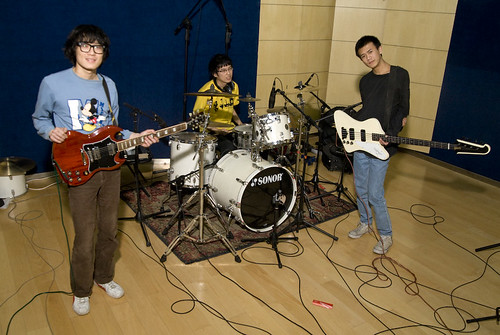We published the first part of this piece back in December. You can read part 1 here
There is a Maybe Mars showcase this weekend in Shanghai’s Dream Factory. You can find out more here
words by Laura Fitch
Maybe Mars – the little label that could, PART 2
The name Maybe Mars came from the pen of Yang Haisong, a Nanjing poet and lead singer of PK14. The Chinese name, Bing Ma Si, comes from a street name, and is a homonym for Maybe Mars. With eight people working for the label and three in the management company Sound Destruction, it’s definitely small, but growing at an incredible pace. “We are doing a lot, very, very quickly,” says MMR creative team member Nevin Domer, 27, who himself was a member of a band that specialized in punk Johnny Cash covers that played D22. Working with such a small team in such a challenging environment is what Domer diplomatically calls “frustrating, but very rewarding.”
Frustrating might be an understatement. Putting out a record in China through in-place distribution networks means entering into a legal grey area, where it gets increasingly more difficult to maintain control over distribution, content, and akin to sacrilege to MMR, recording quality. The country has in-place distribution networks, but as anyone who has ever attempted any kind of business transaction in China knows, what seems straightforward rarely is. For a short while, MMR experimented with its own store, just off one of Beijing’s hippest bohemian streets Nanluoguxiang. But as with countless other small stores, shops and DVD stands got shut down in the paranoia that swept city authorities before the Olympics came to town.
“We use our one and third-party distributors in China,” says Pettis. “We have distribution deals with several indie labels abroad. We also use the Independent Online Distribution Alliance to provide our music on all download sites, including iTunes.” Though running a small business is never an easy task, “we’ve been pretty lucky.”

In a boomtown city where cash is king Pettis’ claim that MMR isn’t out for money but to “to help develop our artists’ talents and to put together a very strong list of what we expect to be the most important CDs in the development of China as a new music center” take on an especially philanthropic tone, and would ring false if Pettis were not putting his money where his mouth is. While most record labels require their musicians to pay for and produce recordings themselves that the label will then feed into their distribution networks, MMR looks to make quality recordings its top priority, often at the expense of its own pocketbook, an impressive feat when a day in a Beijing studio can cost upwards of 5,000 renminbi (US$733), it takes about four or five days to lay down an album, and another four or five to mix it. Plunking down this kind of cash can be a huge impediment to local musicians, when you consider the average wage of a white collar worker in Beijing starts at less than 2000 renminbi (US$293) a month.
Though there “is too little money for there to be much competition” in Beijing’s music scene at the moment, “all of us support our bands and hope they will do better than the others,” says Pettis. “Most competition is pretty friendly, at least among the more important labels, management companies and clubs.” But the most rewarding thing is watching success come to deserving talents, says Pettis. “So many of the artists we liked and helped became important and widely admired so quickly.”